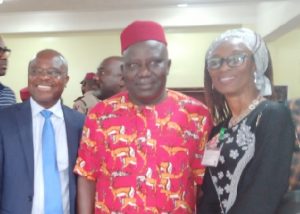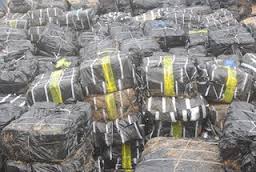Presidential Taskforce, Port Stakeholders Disagree On Reality Of Apapa Gridlock

By Kenneth Jukpor
The Presidential Task Force on the Restoration of Law and Order at the Lagos ports and other stakeholders of the ports had a heated session over the status of Apapa traffic during a stakeholders’ meeting yesterday, organized by Nigerian Shippers’ Council (NSC) to deliberate on the headway.
The Chairman of the task force, Mr. Kayode Opeifa asserted that the gridlock in Apapa had long dissipated, stating that “the situation in Apapa isn’t a gridlock but corruption fighting back the already established order by the task force”, however, other stakeholders lampooned Opeifa as they insisted that the gridlock in Apapa persists.
In his presentation at the summit, Opeifa said; “Everyone here has been speaking and mentioning gridlock in Apapa, however I don’t see gridlock in Apapa. The gridlock must be in our minds at least for the last two months. My team was set up to create order on the port access roads. We achieved this by September last year. Since that time what we have seen is corruption fighting back and not gridlock.”
“Over the years, we have seen gridlocks such as the yuletide quagmire with tankers lined up for petroleum products at the Apapa and Tin Can ports environs in a way that there was no movement; that is gridlock. It took more than three hours to drive to Apapa residential area from Ijora when there was gridlock but it takes 15-30minutes presently. It took me just 15minutes today”, he said.
He also compared the hey days of gridlock when it took several weeks to drive a truck from Mile 2 to Tin Can Port gate, noting that the trip could be completed in less than a day, even as he attributee the delay to the ongoing road reconstruction.
Opeifa’s position stunned stakeholders at the event as his report was in contrast with the daily experience of workers and residents at the Apapa environs.
However, he encouraged stakeholders to contribute towards ensuring the viability and sustainability of the Lilypond and Tin Can 2 truck transit parks as part of efforts to maintain order at the Lagos ports and access roads.
Leading the rebuffal that Apapa gridlock has become history, the Port Manager, Lagos Port Complex (LPC), Apapa, Nigerian Ports Authority (NPA), Mrs. Funmilayo Olotu, said; “There is gridlock in Apapa. We can’t deny that. All through the Christmas season and even before that period I was going to my office using boats. I park my vehicle at Marina and use boats to come over. If there was no gridlock I wouldn’t have to do that. I would drive to my office. The same thing applies for my colleagues in Apapa and Tin Can Island Ports.”
Despite the efforts of the Presidential Taskforce, Olotu lamented that haphazard movement of trucks was still prevalent along the port access roads.
Referring to this practice as ‘flying trucks’ she said; “Trucks can fly in Apapa. We have observed that during the day everyone complies with the call-up system. However, between 12am and 5am, trucks fly. Most truck drivers match brakes for N20,000 to allow others behind them gain access. This is popular among manufacturers’ truck drivers. I have pictorial evidence, videos and documents to back this up. I will present it if anyone challenges me to do so”
Also speaking at the conference, the Publisher, Business Day, Mr. Frank Aigbogun maintained that the Apapa gridlock still exists.
Aigbogun who has spent almost three decades in Apapa, revealed that he abandoned his residence in Apapa which has had no occupants in the last two years as a result of the gridlock.
He also asserted that his company frequently lost top employees as a result of the gridlock as five workers resigned in December 2019 with the Apapa traffic gridlock as the reason they couldn’t work in Apapa.
His words: “I appeal to NPA, the Presidential Taskforce and terminal operators to have unity of purpose. There has to be an alignment in terms of what we should do to solve the problem. There is gridlock in Apapa, NPA just acknowledged this. We have seen the nice pictorials of September 2019 on the traffic situation in Apapa. It took me 25minutes to 27minutes to get to Apapa at that time.”
“The question to ask is what suddenly happened? What happened between September and now? Why is has the situation gone back to 2hours or 3hours for me to get to my office in Apapa. Sometimes, my colleagues call me to say, ‘oga don’t bother coming to the office today because of the traffic situation. There is gridlock in Apapa. My church is in Apapa and on Sunday I was trying to drive from Ikoyi but I couldn’t get to church, yet you say there is no gridlock in Apapa” he said.
In his welcome address, the Executive Secretary of Nigerian Shippers’ Council (NSC) Barr. Hassan Bello, represented by the Director, Inland Transport, Mr. Makinde Akintunde, informed the delegates that a looking congestion was expected at the seaports following the closure of the land borders.
He also noted that the gridlock on the Lagos ports access roads coupled with the expected increase in cargo throughout makes it pertinent for the deployment of electronic call-up system to regulate trucking at the ports.
The NSC boss stressed that the essence of the meeting was to chart the headway for efficient port access management and he encouraged the stakeholders to contribute in the discourse.
What exactly is a gridlock one may ask?
It is a condition of total, interlocking traffic congestion on the streets or highways of a crowded city, in which no one can move because everyone is in someone else’s way.






